It should be with little surprise that this article was bound to come up. This will be the last article that I write for Patheos Agora, and I am doing all I can to ensure it doesn’t morph into a tasteless statement of resignation. You know the kinds of comments I am referring to. Someone wants to make a grand gesture, a huff, and then delete their profile in hopes someone notices. Those always come across as a narcissistic cry for attention, and that is not what this is.
Instead, I want to have an opportunity to give thanks for my experiences and explain my departure. Often, creators who leave a project do not take advantage of explaining their departure, which feels like a lost opportunity. I’ve poured time, research, and several vulnerable moments into my articles. It only seems fair to end the Salt City Pagan blog in the same manner. I hope you will join me in this final article and approach it with an open heart and open mind.
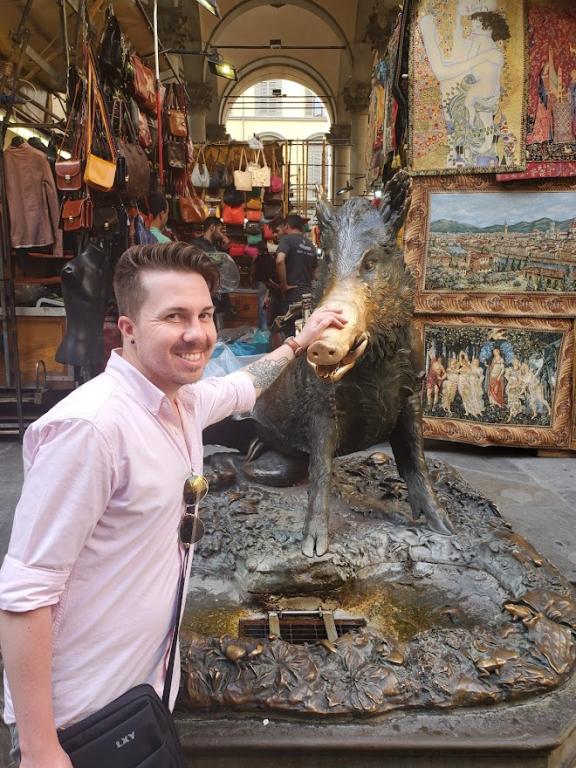
GRATITUDE
Being Pagan
Being Pagan has been genuinely phenomenal for many reasons. Paganism gave me a new theology, which allowed me to ask more critical questions about the faith I was raised within. If I had not come across books by Scott Cunningham, Starhawk, and Ellen Dugan I would not have questioned the status quo for several more years. Paganism fundamentally gave me the tools to view cosmology outside of the framework provided by the Catholic Church, and it was stunningly different!
I do not think people can truly understand the gravity and importance of questioning the faith we are raised in. By asking questions and choosing to leave a familiar faith, we open the doors to begin asking far more essential questions. These include stances in philosophy, science, academia, and the direction we want to direct our lives. Without Paganism, I likely would not have the confidence to push myself in anthropology, history, science, and philosophy. Without Paganism, I probably wouldn’t be an Agnostic-Atheist.
Paganism also gifted me the ability to feel awe for the world around me. The reverence for nature’s cycles beautifully connects us to environmental awareness. What we choose to do with that awareness is entirely up to each individual. For me, it meant taking a firm stance on climate change and advocating for an expansion of green products. This has meant pushing local retailers to begin using eco-friendly packaging and asking them to encourage vendors to do the same.
The reverence expands even further for me. Because I am not a creationist, I feel astonished whenever I contemplate my very existence. The sheer magnitude that it took for life to exist is humbling. Amongst billions of stars, galaxies, and planets, this is the one that sustains life. With or without deity in the equation, we can understand just how rare this opportunity was and how important it is to preserve this planet.

Given a Platform
I am grateful that my voice was added to those of several great thinkers on Patheos. I can still remember how nervous I felt when I sent my initial request to Jason Mankey. It felt as if the odds were slim, and someone from Salt Lake City, Utah, wouldn’t stand a chance amongst the novel Pagans of our time. Yet, Jason took a chance on this young writer and allowed me to share the stage with those I admire.
I’ve been able to use this platform in a way that I am proud of. I feel immense satisfaction when I look at the topics I have covered. My articles have included delicate matters around cultural misappropriation, expansion of terminology, genocide, and abuse. These are only some of the areas that stand out, but there are certainly more.
Nothing was ever wasted or written just to garner popular views. This is precisely how I wanted to approach writing and educating those who would give a moment to my articles. To damn the popular in pursuit of educational material gives readers quality resources that may have otherwise been unavailable. My wish is to see Pagan writers push aside click-bait material in favor of education-based articles. The only way to truly stand out is to break the pattern.
Community
It has been said many times, and I am glad to repeat this statement. The Pagan community saved my life. The hard work from individuals who created a safe social network for Pagans gave me an outlet from an abusive home. Without several of the Salt Lake City Pagan community leaders, I would not have found a group of people who understood what it was like to be treated as different or unwanted.
This has never been to say that Pagans are different or unwanted. I mean to say that several people have come to Paganism because they have experienced similar pains that I have experienced. It is unimaginably valuable, even crucial, for us to feel connected to other beings. When I strip away the occult ideas, I still see a group of amazing people. I am grateful for each person who has taken the time to help me in life. There is no amount of words that can express how much you have done for me.
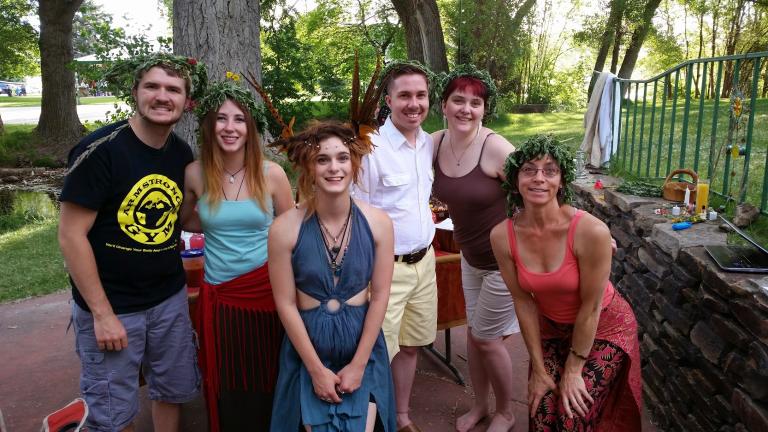
THE CHOICE TO LEAVE
Science
Deities
Scientific and philosophical questions that support my decision to be an Agnostic-Atheist were far more straightforward than trying to rationalize the belief in Gods/Goddesses. The argument can be summed up like this: No God claim has met its burden of proof. To expand further, until something is demonstrated to exist, it is unreasonable to believe it is accurate.
Let’s hypothetically examine the idea of a powerful tea kettle in space that pours life, giving substance to all beings. This tea kettle is neither all-knowing nor all-powerful but let’s say that we believe it exists all the same. Science and philosophy would argue that to believe in this magical tea kettle is unreasonable, and I agree.
The above is one example as to why my belief in deities has disappeared. However, I still fiercely argue that we are all agnostic in the end. Neither atheism nor theism can make an indisputable argument when it comes to the existence of deities. It is important to note that this is not a ticket to claiming belief as fact, in any case. To argue that science cannot definitively disprove deities is creating faith in the God(s) of the gap. This is not an area that allows much room for substantial or verifiable belief.
Divination
This is an area that has indeed caused a great deal of internal anguish. Divination was the fascinating tool that provoked my curiosity in Paganism. It is also the tool that has angered me the most. As a Pagan, I have watched vulnerable people give money to people who claim to be spiritual mediums and resort to making awful decisions. Yes, it is up to each of us to discern good advice from bad advice. However, the methods utilized by these spiritual mediums was so deceptive that it left many patrons with the hope that they found a solution.
My own experiences leave me deeply embarrassed. I have spent thousands of dollars on divination tools, ritual tools, and mediums. Once I became skeptical, I tested my readings and found that everything academic researchers have shown was true. Either the reader did cold readings or had researched me before my appointment. On one recent event, an unwelcome spiritual reader claimed they were speaking with my mother. I can assure you that she is very much alive and a pain in my…..well, you get the point.
Within research, we find the Barnum effect, which states, “Divination and fortune-telling tend to accept certain information as true, such as character assessments or horoscopes, even when the information is so vague as to be worthless.” We find examples of this in statements like, “You’re someone who values those close to you and will do whatever they can to help those people. However, you also get tired easily in social situations and need time to reflect.” This would be considered a worthless and vague statement because it applies to almost everyone. We all value those close to us, and we all get tired after social events.
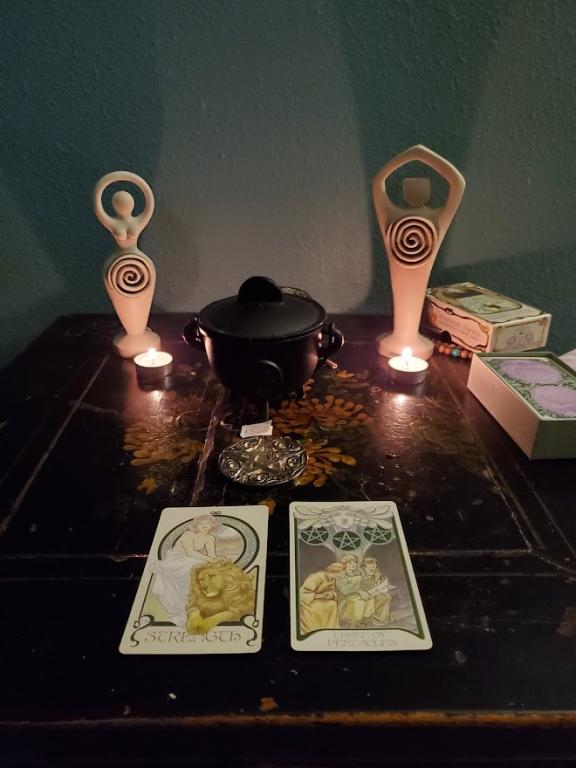
Open-Label Placebo Effect
Concerning spirituality and religion, open-label placebos (OLPs) are placebos without deception in the sense that people know that they are receiving/administering a placebo. The objective is to study and systematically review the effects of OLPs in ritual practices. The basic idea is that a practitioner realizes they are doing a ritual or tradition as a placebo to gain potential benefits from the placebo effect.
For some time, this approach to magick sustained my practice. I found the value in creating a ritual that helped build my confidence in obtaining goals, soothe my heart when it ached, or even handle anger when it arose. However, as time has gone by, I have learned several coping mechanisms for each area. The need to create a ritual has become chore-like in nature and less enjoyable. Since I have given myself the tools to approach stress topics with better evidential practices, it has improved the outcome of each issue. I feel better connected to a situation when I am not utilizing the placebo effect and can better determine best practices.
Culture
Public Health & Safety
This pandemic has brought out the worst sensations. How many of us have lost a loved one or someone we know due to COVID-19? Moreover, how many people do you know who have contracted the virus? If this number is more significant than one in either circumstance, I expect you to understand what I am about to say. I have been appalled at the lack of public health and safety measures amongst our community. Whether that is enforcing masks in Pagan-owned stores, requiring proof of vaccination for events, or maintaining hygiene standards. All of these areas are wavering during a time when we need these measures.
As someone who has helped with efforts to combat COVID-19, the lack of actions illustrates a lack of care for other people. When you’re willing to put your desire for group gatherings over the safety of your community, you are monstrously selfish. When you’re eager to accept maskless employees or patrons so you can earn money, you are also selfish. If not greedy, then it only illustrates ignorance.
We do not need to be researchers or physicians to understand how these essential practices are acts of compassion. The global death toll is over four million, and the rise of a deadly variant is active among us. Taking a stance for other people’s health is a powerful way to show you care and are not ignorant of the world around you.
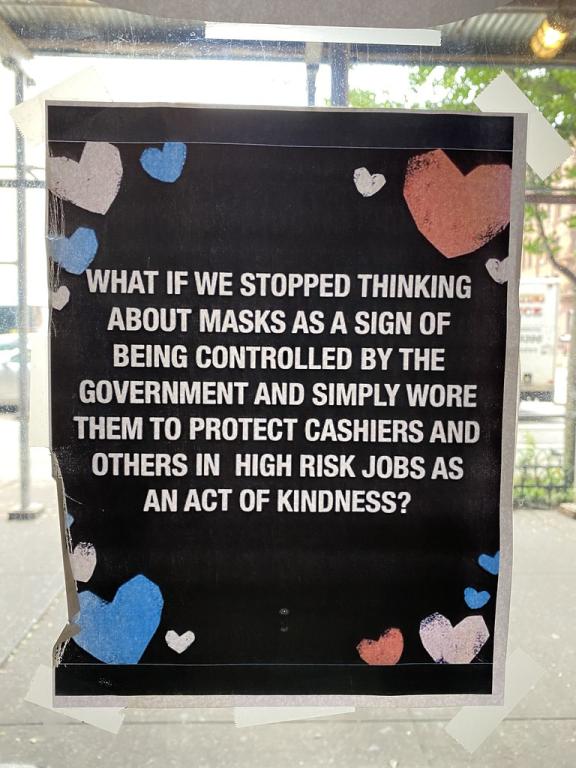
Arguments Over Misappropriation
If one topic has constantly ignited a frenzy of comments, it is an appropriation of culture. Generally, I like to observe the words before making a rebuttal. This is because most people do not understand that they are misusing the phrase. Appropriation happens constantly, and we integrate ideas from other cultures into our own for progress. However, when we misappropriate a culture, we are causing entirely avoidable damage.
I have listed examples such as cultural costumes, religious practices that are not meant to be shared, and intentionally capitalizing on a marginalized group. We know when we are doing an offense because we are beings that know right from wrong. However, this topic seems to be one that several intelligent people cannot seem to let go of. The madness in a person’s eyes when you ask them to stop burning white sage or not to wear Native American headdresses is indeed wild.
Being in the wrong is never a comfortable position to be in. I understand that we may find practices from other cultures beautiful and something we want to experience. In many cases, this can happen without a problem. The problem occurs when preservation is at stake, and we have been asked to honor something from a distance. In this case, we need to be respectful and do what is right for the sake of being decent people.
Expansion
The above statements are all contributing factors behind my choice to leave Paganism and Patheos. It would be wildly unfair for readers to have a writer who does not believe in magick, the Gods, or occult practices. There are lingering items that will always remain with me, and they are ingrained in my ethics. These include observing seasons, awe for our planet, wonder for the cosmos, and questioning the status quo.
My beliefs are not based on unreasonable ideas or a lack of evidence. Instead, the shift in my perception is due to the overwhelming evidence available to me. However, I choose to maintain respect and admiration for the Pagans around me. Each individual is entitled to their own beliefs and to exercise them. I only ask that we exercise our beliefs in a respectful manner and without force.
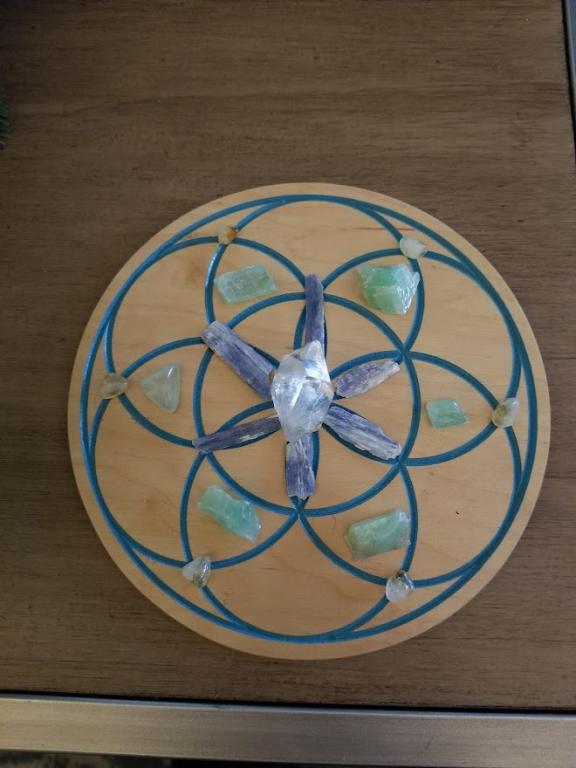
FINAL THOUGHTS
Being an Agnostic-Atheist is exceptionally liberating. The Universe, with all of its wonder, becomes more beautiful somehow. So too does my life and the standard to which I want to live it. Without proof that this life continues, I feel the sense to experience all that I can and to make the most positive impact I possibly can. We are given such a short finite time to live on this planet, and we need to make the most of that time. Not only should we think about our experience but the long-term effects of our actions. Every choice we make now will ripple out for generations to come. It would be a tragedy if those experiences were negative due to our current efforts.
I believe that now is the prime time to begin making a better world than the world we were born into. We have the opportunity to put religion and bias aside to espouse equality. We can start to amend for years of slavery, genocide, xenophobia, homophobia, bigotry, and hate. We can fight for a planet that is cleaner and healthy because this is our only home. Now is the time to move small-minded individuals aside so that visionaries can help our hopes become a reality.
Paganism has the opportunity to help lead efforts in each of these areas. Leaders and individuals need to take stances that help our planet progress. Elie Wiesel said, “We must always take sides. Neutrality helps the oppressor, never the victim. Silence encourages the tormentor, never the tormented.” This idea applies to stances on racism, LGBTQ+ issues, public health and safety, and your right to have a voice.
As my final article comes to an end, I want to reiterate my thanks to the community. Thank you to each person who has taken the time to read my articles. A person is rarely able to bid farewell with such gratitude. Though I will not be gone, I am changed. We all must change and grow. I’ve grappled with the final quote that I would like to leave you with, but I think I have found just the ticket. This quote finds common ground, interconnectedness and expresses the vast wonder that each of us should hold in our hearts.
As I say goodbye, I leave you with this quote from Carl Sagan.

“Look again at that dot. That’s here. That’s home. That’s us. On it everyone you love, everyone you know, everyone you ever heard of, every human being who ever was, lived out their lives. The aggregate of our joy and suffering, thousands of confident religions, ideologies, and economic doctrines, every hunter and forager, every hero and coward, every creator and destroyer of civilization, every king and peasant, every young couple in love, every mother and father, hopeful child, inventor and explorer, every teacher of morals, every corrupt politician, every “superstar,” every “supreme leader,” every saint and sinner in the history of our species lived there – on a mote of dust suspended in a sunbeam.
The Earth is a very small stage in a vast cosmic arena. Think of the endless cruelties visited by the inhabitants of one corner of this pixel on the scarcely distinguishable inhabitants of some other corner, how frequent their misunderstandings, how eager they are to kill one another, how fervent their hatreds. Think of the rivers of blood spilled by all those generals and emperors so that, in glory and triumph, they could become the momentary masters of a fraction of a dot.
Our posturings, our imagined self-importance, the delusion that we have some privileged position in the Universe, are challenged by this point of pale light. Our planet is a lonely speck in the great enveloping cosmic dark. In our obscurity, in all this vastness, there is no hint that help will come from elsewhere to save us from ourselves.
The Earth is the only world known so far to harbor life. There is nowhere else, at least in the near future, to which our species could migrate. Visit, yes. Settle, not yet. Like it or not, for the moment the Earth is where we make our stand.
It has been said that astronomy is a humbling and character-building experience. There is perhaps no better demonstration of the folly of human conceits than this distant image of our tiny world. To me, it underscores our responsibility to deal more kindly with one another, and to preserve and cherish the pale blue dot, the only home we’ve ever known.“
― Carl Sagan, Pale Blue Dot: A Vision of the Human Future in Space


















